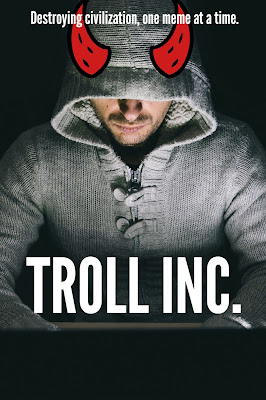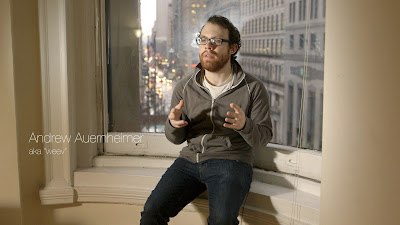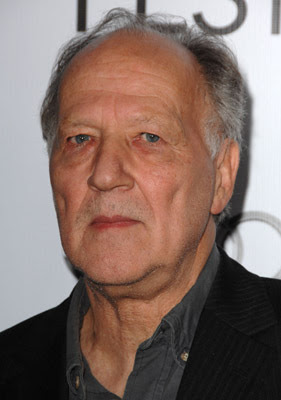You may have heard or read about a certain internet troll named Andrew Alan Escher Auernheimer who goes by the alias of Weev. If so (or even if not), you're going to learn a hell of lot about him from the new documentary TROLL INC., in which Auernheimer plays a major role, acting as our host and guide through the thicket of internet trolling. TrustMovies admits he went into this film with a heavy bias against what he imagined to be the very negative/ugly/angry world of "trolling." Coming out of the doc, however, he felt both surprised and somewhat chastened at the realization that internet trolls -- some of them anyway -- might actually be serving a valid and important purpose by keeping the world's populace more aware of the how easily (often stupidly) we can be swayed by what we see and hear online.
As produced, directed, edited and even partially photographed by a filmmaker new to me named George Russell, the movie begins with an introduction to Weev (shown above and below) and to what internet trolls do and how they do it -- with an emphasis more on the positive side of things than the negative, which can move from mere nasty joking to stalking, hacking and much worse. For instance, we're shown how, in Australia, the internet was able to defend its own community from government censorship.
Early on we're told that "computer security on the internet is shockingly, inherently insecure," and then shown examples of this, such as the Apple iPad/AT&T security scandal, which Weev and his compatriot Daniel Spitler, along with the "organization" known as Goatse Security, leaked to the world -- and afterward, as you'll learn, paid bigtime for their efforts.
We also learn of that infamous and bizarrely funny would-be scandal, Amazon-Hates-Gays-and-Is-Delisting-GLBT-products, that Weev foisted upon the world -- for fun and also to make us more aware of the nonsense that can be provided some of our major companies due to their lack of proper security on the internet.
To the film's credit, Weev comes off as both a kind of necessary prophet and an asshole. "Being a jackass on the internet is a real career," he notes at one point toward film's end. He's a genius of sorts but mostly a provocateur. But hearing the thoughts of and praise from his many friends and compatriots should give you pause. As one of them notes (the fellow who paid Weev's parole bail after his Apple/AT&T arrest), "I bailed him out, despite all the terrible things he's said, because he has a strict moral code." I think you'll agree with this once you've finished the film. Another explains that Weev is truly "testing the limits of our Constitution's First Amendment."



































.jpg)












